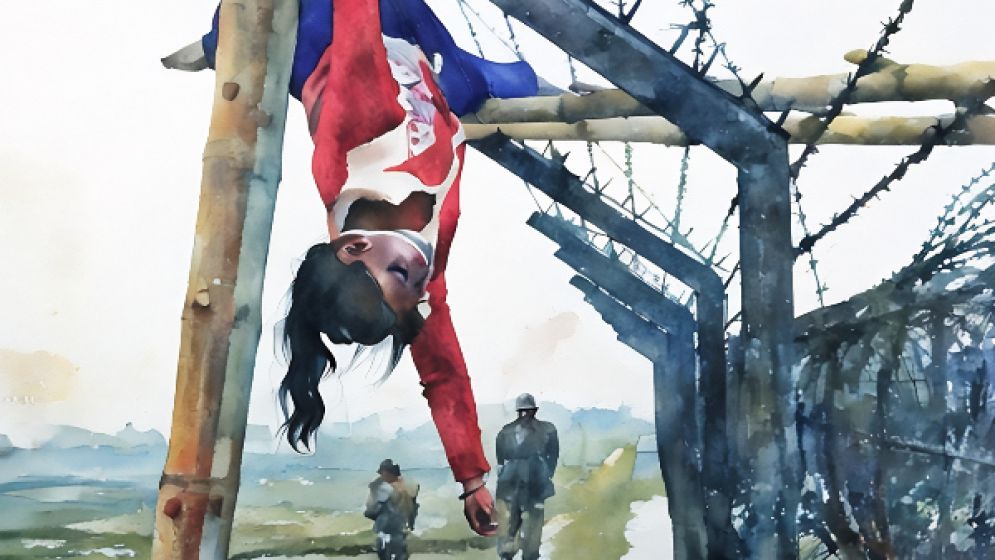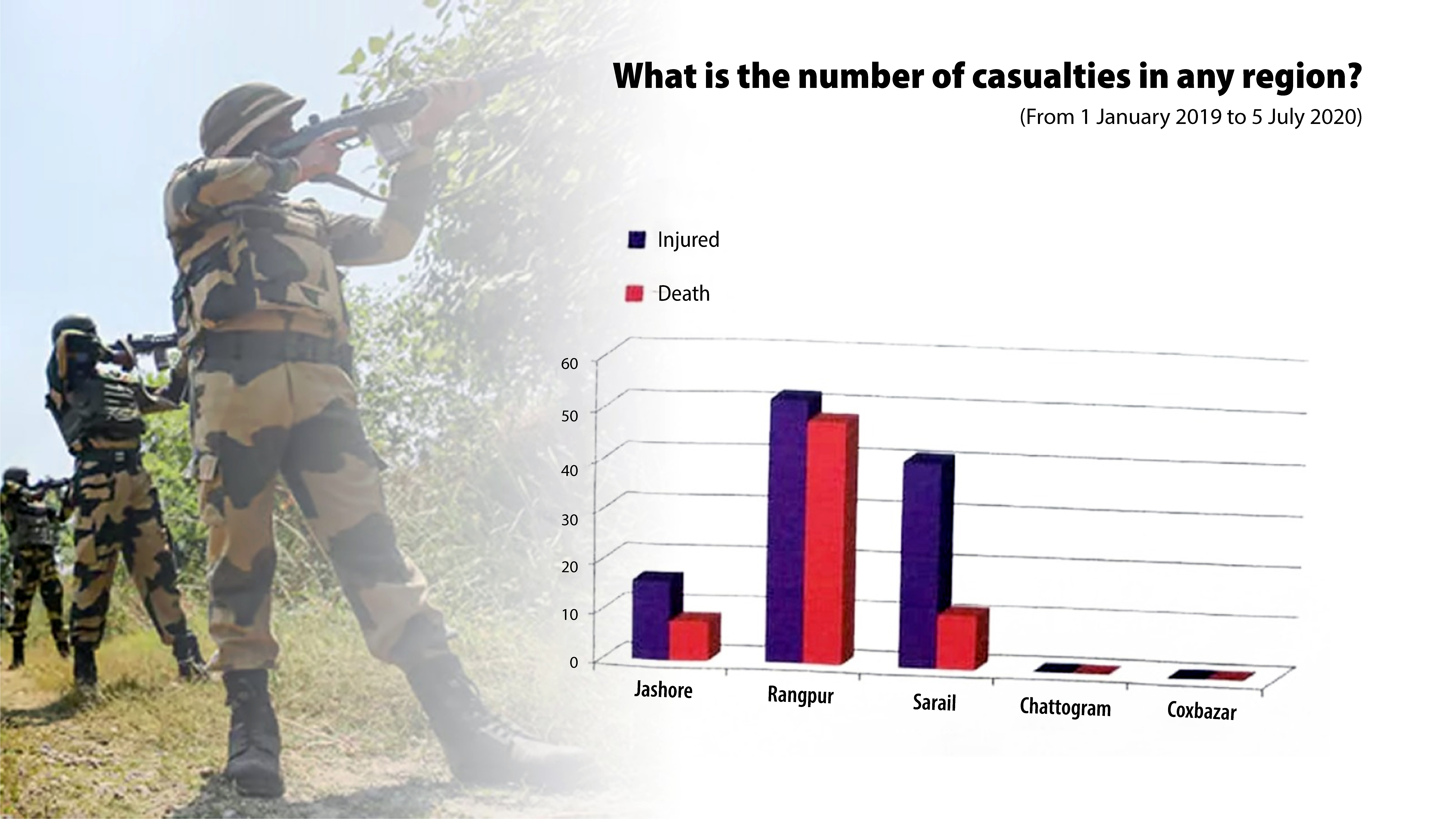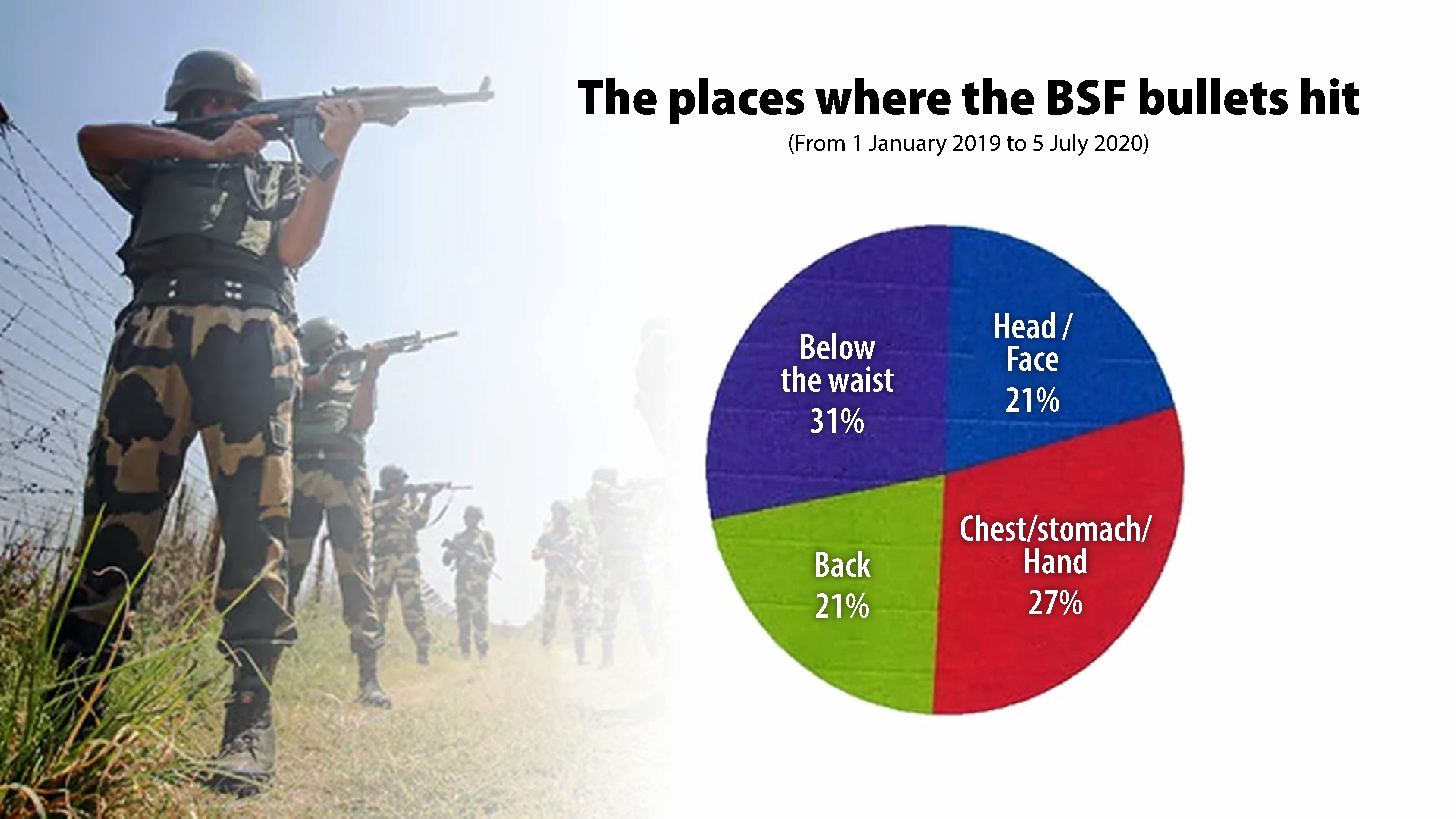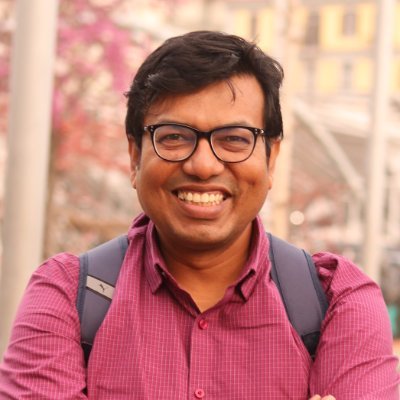Fatal shootings of Bangladeshi civilians by BSF raise concerns over "self-defense" claims

The relationship between Bangladesh and India is marked by a mix of optimism and tension, with border killings being a significant source of discord.
Despite repeated assurances from India to curb border killings, such incidents persist, including gunfire within Bangladesh's borders, which has deeply concerned its citizens.
Alongside calls for an end to border killings, human rights activists in Bangladesh have been outspoken on this issue but it seems their concern fails to reach the ears of New Delhi.
Prime Minister Sheikh Hasina just completed her bilateral visit in India but ironically the issue of border killing wasn’t discussed with relevant officials in Delhi.
The Border Security Force (BSF) of India maintains that their use of force, including non-lethal weapons, is strictly for self-defense. The Indian government often characterizes those killed near the Bangladesh border as criminals.
However, research from the Bangladesh Border Guards (BGB) contradicts these claims.

Killing with intent
Post-mortem examinations reveal a pattern of lethal force employed by both the BSF and Bangladeshi citizens, with bullets often targeting vital areas like the chest, back, or head.
These violent incidents occur on both sides of the border, sometimes within India itself or along the zero line, resulting in fatalities in both Bangladesh and India.
Human rights groups in Bangladesh condemn these killings by India as unacceptable and detrimental to the relationship between the two nations.
Data from Ain o Salish Kendra (ASK) and the Human Rights Support Society, indicate that between January and May 2024, at least 11 to 14 Bangladeshis were killed and 9 to 30 injured in border incidents.
Saiful Islam, 30, was fatally shot in the back by BSF gunfire at the Chapainawabganj border on April 2, as recounted by his grieving brother, Robiul Islam.
On May 3, another 30-year-old Bangladeshi farmer Abul Kalam Duku was fatally shot in the chest by BSF gunfire at the Patgram border in Lalmonirhat district.
Tragically, just 18 hours before Indian Foreign Secretary Vijay Gokhale's visit to Dhaka on May 8, two more Bangladeshis, Abdul Jalil (24) and Yasin Ali (23), were allegedly killed by BSF gunfire at the Tetulia border in Panchagarh district.
BGB reports indicate one victim was shot in the head and the other in the upper back.
Director General of BGB Major General M. Ashrafulzaman Siddiqi informed that most killings occur within Indian territory, and Bangladesh consistently lodges strong protests after each incident.
During the 54th Director General-level meeting held in Dhaka in March, he urged Indian authorities to take measures to reduce border killings and enhance bilateral relations.
BSF Director General Nityanand Agarwal reiterated the commitment to reduce such incidents.
However, the ongoing killings have frustrated Bangladesh, as noted by Kamal Uddin Ahmed, Chairman of the National Human Rights Commission of Bangladesh.
He emphasized that such incidents are not observed on the India-Pakistan or China borders.

An increasing alarming trend
A 2020 study of the Border Guard of Bangladesh (BGB) analyzing the killings of Bangladeshi citizens by India's Border Security Force (BSF) along the Bangladesh border revealed a disturbing pattern: the BSF often fires only two to three rounds before killing two Bangladeshi citizens, suggesting premeditated intent.
Despite these regular incidents, there are no similar cases of Indian citizens being killed along the border.
This is not due to a lack of illegal entry by Indian citizens, but rather because they are typically handed over to the BSF respectfully, said the BGB study.
The study analyzed statistics of injuries and deaths caused by BSF gunfire between January 2019 and July 2020 and it found that 67 Bangladeshis were killed and 109 injured.
Notably, 21% of the bullets hit the face or head, 48% hit the chest, abdomen, hands, or back, and 31% hit below the waist, with most incidents occurring in the Rangpur region.
These findings underscore the disproportionate use of lethal force by the BSF and raise questions about their adherence to international human rights standards, as unauthorized entry, cattle smuggling, or drug trafficking do not warrant the death penalty.
The BGB study which analyzed 128 incidents along the Bangladesh-India border revealed that 98 involved gunfire, with additional instances of torture and killings.
Further examination of 143 incidents between January 1, 2019, and July 5, 2020, showed that 98 involved gunfire, with 45 occurring during the day and the rest at night.
Beyond gunfire, Bangladeshi citizens are often subjected to cruel injuries or death through the use of sticks, boots, and local weapons, constituting severe violations of international human rights laws.

What can be done?
The research emphasizes that while the right to self-defense exists, the BSF's actions often exceed this mandate.
Bangladesh can leverage international law and agreements, such as the United Nations Charter and the 1970 Declaration of Friendship and Mutual Cooperation, to address these issues with India and advocate for a reduction in border violence.
Additionally, the BGB's research suggests that alternative approaches, such as handing over Bangladeshi citizens who illegally enter India to the BSF for prosecution, could significantly reduce cross-border violence and fatalities.
Home Minister Asaduzzaman Khan has repeatedly urged the Indian Border Security Force (BSF) to take effective steps to reduce border killings. Even in March last year, when representatives of the BSF visited Bangladesh, Minister Asaduzzaman strongly urged them to take effective steps to stop border killings.
Manabadhikar Suraksha Mancha or Masum–a human rights organization in West Bengal—has been working for a long time to demand an end to border killings.
The organization's Secretary, Kirity Roy, told Bangla Outluk, "Killings are universally condemned, and we, as human rights workers, are against killings and torture."
He lamented that regular and systematic killings have been happening on the India-Bangladesh border, and the perpetrators are government forces.
“In a country where killing is a heinous crime according to the constitution and laws, the Indian BSF has been perpetrating these since its inception," he said.
—

